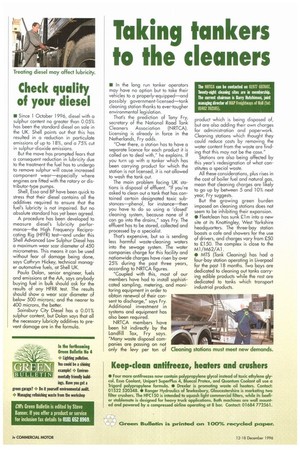Taking tankers to the cleaners
Page 22

If you've noticed an error in this article please click here to report it so we can fix it.
• In the long run tanker operators may have no option but to take their vehicles to a properly-equipped—and possibly governmentI icensed—tank cleaning station thanks to ever-tougher environmental legislation.
That's the prediction of Tony Fry„ secretary of the National Road Tank Cleaners Association (NRTCA). Licensing is already in force in the Netherlands, Fry adds. "Over there, a station has to have a separate licence for each product it is called on to deal with," he explains. If you turn up with a tanker which has been carrying product for which the station is not licensed, it is not allowed to wash the tank out.
The main problem facing UK stations is disposal of effluent. "If you're asked to clean out a tank that has contained certain designated toxic substances—phenol, for instance—then you have to do so using a 'closed' cleaning system, because none of it can go into the drains," says Fry. The effluent has to be stored, collected and processed by a specialist. That's expensive, but so is sending less harmful waste-cleaning waters into the sewage system. The water companies charge for this facility and nationwide charges have risen by over 25% during the past three years, according to NRTCA figures.
NRTCA members have been hit indirectly by the Landfill Tax, Fry says. "Many waste disposal companies are passing on not only the levy per ton of product which is being disposed of, but are also adding their own charges for administration and paperwork. Cleaning stations which thought they could reduce costs by removing the water content from the waste are finding that this may not be the case." Stations are also being affected by this year's redesignation of what constitutes a special waste. All these considerations, plus rises in the cost of boiler fuel and natural gas, mean that cleaning charges are likely to go up by between 5 and 10% next year, Fry suggests. But the growing green burden imposed on cleaning stations does not seem to be inhibiting their expansion. • Fleetclean has sunk 21m into a new site at its Knottingley, West Yorkshire headquarters. The three-bay station boasts a cafe and showers for the use of drivers, and charges vary from 250 to 2150. The complex is close to the M1/M62/A1 .
• MIS (Tank Cleaning) has had a four-bay station operating in Liverpool for the past 18 months. Two bays are dedicated to cleaning out tanks carrying edible products while the rest are dedicated to tanks which transport industrial products.
















































































































